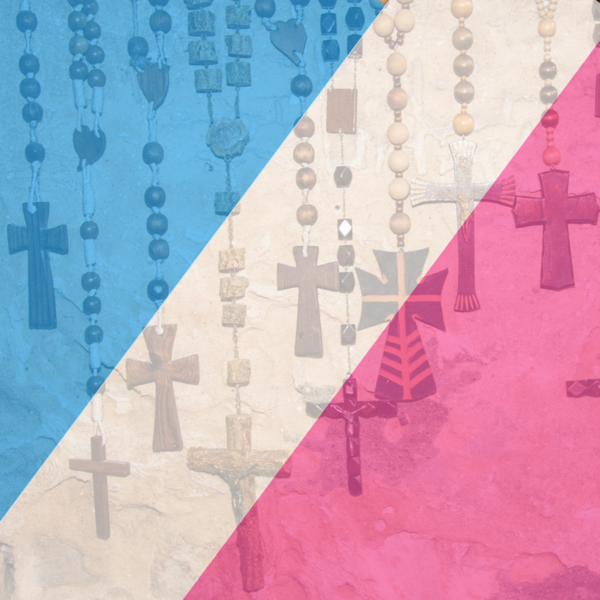Dear White Trans People who are Anti-Religion
Dear White Trans People who are Anti-Religion,
There is a lot of talk in queer and trans community about how backwards religion is. Religion has been around for hundreds and thousands of years and obviously received its fair share of pushback, but only very recently have people began to interrogate whether the very category of religion is itself optional. This anti-religious perspective is especially ripe among millennials. For instance, young people believe in higher powers over God, self-ID as spiritual over religious, and easily ascribe most acts of bigotry to a person's religious affiliation. Religion is often a raw topic in queer and trans communities, one that brings up feelings of trauma, pain and exclusion.
Queer and trans people who grew up in religious families often experienced their faiths in fierce opposition to their identities. Whether this takes the form of Catholic guilt, Evangelical Christian concepts of hell, or deep-rooted heteronormative family values, religion is a contested topic for many trans people. Gay and queer people have been told that they are going to hell, that their sexualities can and should be corrected and that they are sick in the eyes of God. Trans people are considered repulsive and demented in the eyes of many public religious figures. Many queer and trans people raised religious have an extremely tense relationship, if any at all, with their families. These relationships often straddle very careful lines of communication, visibility, morality, denial and avoidance. In a world of scary white people, Linda Harvey, Klingenschmitt and his belief that transgender people are possessed by demonic spirits, and Trump's highly contested military ban, the relationship between religion and the trans community isn't a straightforward one.
However, I have seen a number of white trans folks write off religion as the root of all evil and transphobia without considering how their privilege heavily influences this rejection.Religion as an institution imbues people with power, which can be used and abused;yet religion has always been a tool used by marginalized people to endure oppression. Religion is often a tool of survival for communities of color across the globe in actively resisting forces of racism, colonialism, and imperialism. White queer and trans people who criticize and rebuff religion often forget this extremely important detail.
It seems important to make the distinction of how religion functions when talking about communities of QTPOC communities and white queer and trans folks. I too often hear white folks scapegoat the Black Church, Muslim communities, and Latinx Catholicism as places where sexism, homophobia and transphobia are rampant and indisputable. These claims are often tinged with an air of pity that is tinged as racist. Why is it so easy for white people to point their fingers at religion in communities of color and say: that is backwards? It's hard to hear those sentences from white queer and trans people and not tap into the extended legacy of white colonizers looking at black and brown communities as degenerate and unevolved.
White queer and trans people often talk about how sexist hip-hop is, how anti-feminist hijabs are, and how transphobic and binary the Spanish language is for not having gender neutral pronouns. These knee-jerk snap judgements of cultural practices of communities of color are difficult to swallow when steeped in the ignorance of white privilege. There is also a rich hypocrisy here that ignores the violent ways that white colonizers imposed the gender binary through religious and legal persecution on black and brown people and punished the gender variant people in those communities. In the words of khari's comic book My gender is My Gender: "european colonialism forced heterosexism, cissexism patriarchy and white supremacy down our throats. now People and Color throughout the world are regularly seen as backwards, as ignorant. we're seen as backwards by both the descendants of the colonizers and the descendants of the colonized, and those holding both identities."
It is necessary to acknowledge that gender variant, trans, and nonbinary identities have always existed for folks with indigenous, black, and brown ancestry. Gender variant people in these cultures were often attributed semi-divine statuses and regarded as powerful leaders, spiritual oracles and celestial bodies. Black and brown communities were punished for gender practices that did not conform to "proper" European notions of masculinity and femininity. White people forced these communities to assimilate to Western religious practices that reinforced the gender binary system, and now white queer and trans people have the nerve to condemn communities of color for these "backwards" religious beliefs.
What can we do as a white queer and trans people to honor the gender-variant ancestry of black and brown communities and not impose Western ideals of gender in our politics? How can we name our own pain within white religious institutions without scapegoating religion and its function within POC communities? It's time to start a new conversation on religion and trans politics—one that holds this history as a way forwards, the key to a new future.
Mud Howard is a white, non-binary trans poet who believes in the healing power of the selfie. Mud writes creative non-fiction, lyrical essays and really good international love letters. They write about witches and ghouls, the inadequacy of the binary, covert toxic masculinity in the queer community and the big blue ocean. You can find their work in THEM literary journal, The Lifted Brow, Black Napkin Press, and Cleaver Magazine. Mud is so excited to collaborate with Transfaith for this monumental fellowship.

